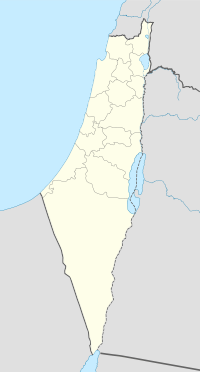Tantura
| Tantura | |
|---|---|

Tantura in 1935 during the British Mandate
|
|
| Arabic | الطنطورة |
| Name meaning | "The Peak" |
| Also spelled | al-Tantura |
| Subdistrict | Haifa |
| Coordinates | 32°36′34″N 34°55′04″E / 32.60944°N 34.91778°ECoordinates: 32°36′34″N 34°55′04″E / 32.60944°N 34.91778°E |
| Palestine grid | 142/224 |
| Population | 1,490 (1945) |
| Area | 14,250 dunams 14.3 km² |
| Date of depopulation | 23 May 1948 |
| Cause(s) of depopulation | Expulsion by Yishuv forces |
| Current localities | Nahsholim,Dor |
Tantura (Arabic: الطنطورة, al-Tantura, lit. The Peak; Hebrew and Phoenician: דור, Dor) was a Palestinian Arab fishing village located 8 kilometers (5 mi) northwest of Zikhron Ya'akov on the Mediterranean coast of Israel. It was built on the ruins of the ancient Phoenician city of Dor. In 1945 it had a population of 1,490.
Dor was the most southern settlement of the Phoenicians on the coast of Syria and a center for the manufacture of Tyrian purple, extracted from the murex snail found there in abundance. Dor is first mentioned in the Egyptian Story of Wenamun, as a port ruled by the Tjeker prince Beder, where Wenamun (a priest of Amun at Karnak) stopped on his way to Byblos and was robbed.
According to the Book of Joshua, Dor was an ancient royal city of the Canaanites commanding the heights, whose king became an ally of Jabin of Hazor in the conflict with Joshua. Dor is also mentioned in the Book of Judges as a Canaanite city whose inhabitants were put to 'taskwork' when the area was allotted to the tribe of Manasseh. In the Book of Kings, Dor was said to be incorporated into David's Israelite kingdom. In the 10th century BCE, it became the capital of the Heights of Dor under Solomon, and was governed by his son-in-law, Ben-abinadab as one of Solomon's commissariat districts.
...
Wikipedia

